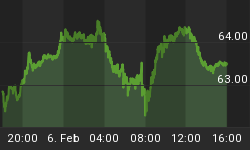"...Three hundred billion here, $300bn there, and pretty soon you're talking about a wave of dilution hitting cash-holders, bond owners, stock investors and US Dollar earners everywhere..."
YOU'D BE FORGIVEN for thinking they planned it together last night.
Four out of the top nine headlines on Yahoo's financial homepage today came straight from the press departments of the US authorities.
- Fed Extends Emergency Loan Program for Wall Street
- Bush Signs Housing Bill to Provide Mortgage Relief
- Government Announces Plans to Borrow $27 Billion
- SEC Extends Restrictions on Short-Selling
Throw in Congress locking evil speculators out of the oil markets, and investors can't argue with such massed intervention by Washington's finest PR teams.
So sell commodities, buy financial stocks. Stay in your house, and stay away from those lines at the bank. It's the American way, as approved by the White House in July 2008.
Hence the No.1 headline to top them all - "Jobs Data, Fed Plan Keep Stocks in Rally Mode". Coupled with the apparently bullish ADP payrolls report (which saw large US companies shed 32,000 staff while manufacturing employment fell for the 23rd month in a row) the promise of tax-payers' largesse helped push the Dow to a one-week high, a mere 20% off its top of October last year.
But the cost? Wednesday's "big four" press releases are hard to price. But cash savers, wage earners, retirees and government-bond owners alike would be right to fear some kind of "dilution" as Wall Street calls it when shareholder value gets washed away by emergency cash raisings.
Take the Securities & Exchange Commission for starters. The SEC is already set to chew its way through almost $1 billion in fiscal-year 2008, almost three times its budget of a decade ago. To help cover that bill - along with the rest of its $171bn deficit for the June-Sept. quarter - the Treasury will sell an extra $27 billion in new 10-year and 30-year bonds next week.
And next year, of course, the Treasury will have to float a record $482bn in tax-promised debt.
Emergency loans to Wall Street meantime - plus mortgage relief to 400,000 home-buyers - won't come cheap either. For every dollar of debt now outstanding, a fair chunk of change will now be added after today's state-sponsored largesse.
Technically, that spells i-n-f-l-a-t-i-o-n of the currency. And yet, for today, you can Buy Gold at a little over $900 per ounce. That might soon come to look like the sale of the century if Washington's PR teams don't take a vacation.
First up, the Federal Reserve. Today it raised its line of credit at the European Central Bank (ECB) by 10%, taking it to $55bn. More crucially, the Fed's now offering US investment and commercial banks some $75 billion in four-week loans - plus $25bn in 12-week loans - at alternate auctions to be held every two weeks until the end of next January.
(It's also doing its damnedest to revive the world's taste for alphabet soup, replacing the MBS, ABS, CDS and CPDOs of yesteryear's financial bubble with today's PDCF, TSLF and TAF of ongoing aid.)
The Fed's loans aren't quite open-ended, you'll note - even if they are set to reach a rolling total of $300bn three months from now. They're only made "in light of continued fragile circumstances in financial markets," explains the Fed. And just as soon as the credit markets cease being "unusual and exigent", the big investment houses will have to make their own arrangements without Ben Bernanke's check-book.
Out-weighing the Fed five-fold and then some, however, comes the Treasury's support for refinancing home-loans. "By CNBC's count," reports the Wall Street Journal, "the federal government has already made roughly $1.4 trillion available to refinance mortgage debt since the housing meltdown began.
"That makes this week's bill, which adds another $300 billion to the pot, seem a mite anticlimactic."
Still, every little helps, right? And at least that $300bn will be lent - alongside the Fed's extra $300bn in revolving loans - at way below the current inflation rate. No point trying to foist new debt on the world if the cost of borrowing is higher than zero!
That's why, here at BullionVault, we don't expect a hike in the Fed Funds rate anytime soon. Which is why, for the near term and longer, we remain bullish on Gold.
Anyone hoping to defend their savings and wealth might also want to consider the "dilution" now hitting cash owners. It will prove similar in practice - if not greater in impact by a magnitude of size and then some - to the dilution that's already hit or threatening stockholders in Washington Mutual, Citigroup, UBS, Merrill Lynch and Royal Bank of Scotland here in London.
Whatever your money's worth now, it will have to compete with very many more dollars - and soon - when you come to spend it. Again, that spells i-n-f-l-a-t-i-o-n. Rising prices will be the visible cost of less purchasing power.
The long-term solution? Absent Paul Volcker, beating inflation just requires nimble thinking, as this press release proved today:
"With effect from the 1st of August, 2008, all monetary valuations have been re-denominated by a factor of 1:10,000,000,000 - which effectively means the removal of ten (10) zeroes from all monetary values;
"What this means is that $10,000,000,000 (ten billion dollars) therefore will translate to $1 (one revalued dollar) with effect from August 1, 2008."
Who can achieve such monetary magic? The Reserve Bank of Zimbabwe did on Wednesday. Fixing inflation is easy, you see - even in a country where the runaway money supply means calculators and ATMs can no longer cope with the billions and trillions needed to handle the simplest transactions. The price of eggs rose by 60% between Monday and Tuesday. The maximum banking withdrawal will not cover the price of a single bread roll.
But just knock off ten zeroes, and who's to complain?















